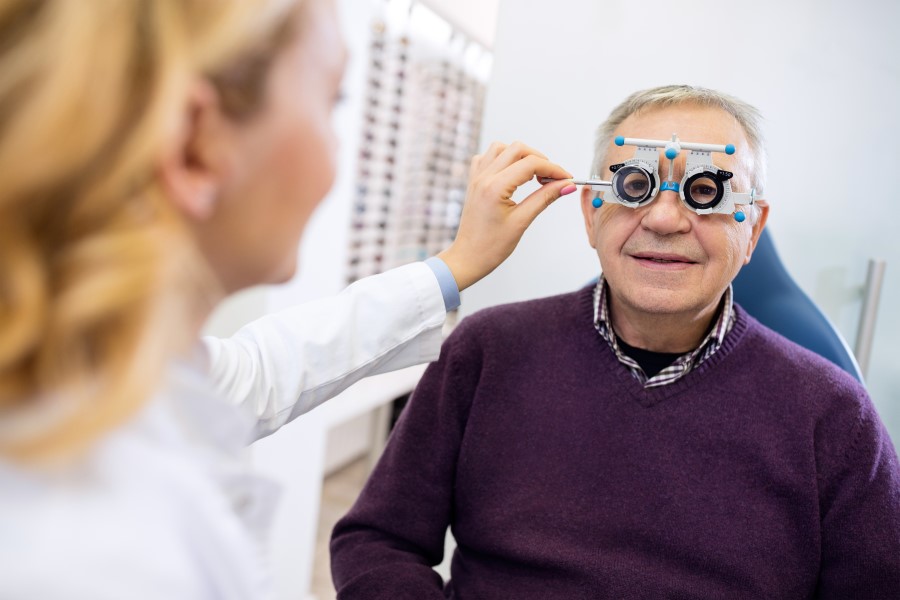Cataract Awareness Month: How Can Seniors Protect Their Eyes?

August is Cataract Awareness Month. For seniors, cataract awareness and prevention is extremely important, since 1 in 5 adults over the age of 65 develops a cataract.
Vision loss can be a highly concerning aspect of getting older. Eye problems like glaucoma, macular degeneration, and diabetic retinopathy can cause significant vision loss and even blindness. Cataracts are the leading cause of blindness and vision loss in the world. In fact, according to the American Academy of Ophthalmology, half of all Americans will develop a cataract by age of 75.
Today we’re exploring some ways that seniors can protect themselves from cataracts as they age.
Know the Risk Factors for Cataracts
The main risks for developing cataracts include:
- Getting older: 1 in 5 people over 65 has a cataract. The likelihood of a cataract causing vision loss increases as we age.
- Having diabetes
- Being obese
- Being a smoker
- Eye injury
- Eye inflammation
- Prolonged use of corticosteroids
- Prolonged exposure to sunlight without eye protection
- Exposure to radiation
If you have any of these risk factors for developing a cataract, it’s important to be aware of your eye health. Visit your eye doctor to discuss possible preventative measures you can take to lower your risk.
Know the Symptoms of Cataracts
It’s important to know the symptoms of cataracts so you can visit your eye doctor before your cataract gets worse.
The main symptoms include:
- Cloudy or foggy vision
- Blurred vision
- Double vision
- Yellowing or dulling of colors
- Sensitivity to light or glare
- Seeing a “halo” around lights
- Trouble seeing in dim lighting
- Declining night vision
Cataracts can make it especially difficult for seniors to drive at night, as their vision is clouded and it’s harder to see important road markers and even other vehicles.
Eat Lots of Leafy Green Vegetables
There is some evidence to suggest that eating leafy green vegetables like spinach can protect your eyes from damage caused by ultraviolet light (sunlight). Antioxidants like lutein and zeaxanthin, which are plentiful in vegetables like spinach, collard greens and kale, can help defend the lens of the eye against harsh UV rays.
Keep Health Conditions Under Control
Individuals with diabetes are 2 to 5 times more likely to develop cataracts. Individuals who are obese also experience an increase risk in developing certain types of cataracts. Poorly controlled high blood pressure can also raise a person’s risk of developing cataracts. If you have any of these conditions, it’s important to maintain them to lower your risk of developing cataracts and other eye diseases.
Get Regular Eye Exams
It’s important for all seniors to visit an eye care professional on a regular basis. This will help ensure that any problems with the eyes are caught early and treated effectively. Fortunately, if one does develop cataracts which interfere with daily life, cataract surgery is generally safe and effective in restoring eyesight.
How In-Home Senior Care Can Help
For seniors at risk of developing cataracts or vision problems, being at home alone can seem scary and even dangerous. Seniors with vision issues experience more falls in the home and are often no longer able to drive. This can make visiting the eye doctor for important exams and treatments next to impossible.
In-home care services can help seniors with vision problems get the personal care and assistance they may need to age in place safely. A trained caregiver from Visiting Angels can help your senior loved one get to important eye doctor appointments and remind them to take their medications, for instance. For seniors who have low vision issues due to cataracts, a caregiver can help prevent dangerous falls in the home by doing routine safety checks throughout the home.
Do you or someone you know need caregiving services in Burlington or Mercer Counties in New Jersey? Contact Visiting Angels to learn more about in-home care services and the elder care professionals who provide them.
More from our Resource Center: Caring for a Senior Parent With Low Vision
Visiting Angels’ service area in Mercer County, New Jersey includes:
Allentown, Ewing, Ewing Township, Hamilton Township, Hamilton Square, Hopewell, Hopewell Township, Lawrence Township, Lawrenceville, Lambertville, Princeton, Princeton Township, Princeton Junction, Robbinsville, Skillman, Titusville, Trenton, Upper Freehold Township, West Windsor, West Windsor Township, Windsor, Yardville, and surrounding areas
Our service area in Burlington County, New Jersey includes:
Beverly, Browns Mills, Bordentown, Burlington, Columbus, Cookstown, Hainesport, Jobstown, Lumberton, Marlton, Medford, Mount Holly, Moorestown, Mount Laurel, Palmyra, Pemberton, Riverside, Riverton, Shamong, Willingboro, Wrightstown, and surrounding areas
